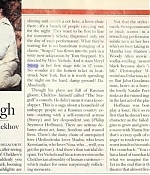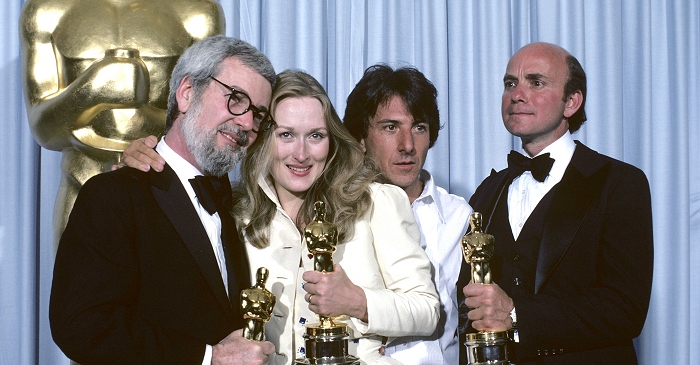|
Simply Streep is your premiere online resource on Meryl Streep's work on film, television and in the theatre - a career that has won her acclaim to be one of the world's greatest living actresses. Created in 1999, Simply Streep has built an extensive collection over the past 25 years to discover Miss Streep's body of work through thousands of photographs, articles and video clips. Enjoy your stay and check back soon.
|
|
Review: Flying High
Newsweek ·
August 20, 2001
· Written by Kathleen McGuigan
|
You’re leaving the Delacorte Theater in Central Park after seeing the new production of Chekhov’s “The Seagull,” and suddenly you see something eerie under the dark, looming trees. Lanterns are glowing, flashlights are shining and there’s a cot here, a lawn chair there–it’s a bunch of people camping out for the night. They want to be first in line for tomorrow’s tickets, dispensed only on the day of each performance. What they’re waiting for is no humdrum restaging of a classic. “Seagull” has flown into the park in a witty new adaptation by Tom Stoppard. It’s directed by Mike Nichols. And it stars Meryl Streep in her first stage role in 17 years. No wonder it’s the hottest ticket in heat-struck New York. But is it worth spending the night on the hard, damp ground? Da. Absolutely.nThough his plays are full of Russian gloom, Chekhov himself called “The Seagull” a comedy. He didn’t mean it was a knee-slapper. This is a saga about a household of unhappy people on a Russian country estate–starting with a self-centered actress (Streep) and her despondent son (Philip Seymour Hoffman). There are serious debates about art, fame, freedom and wasted lives. There’s the daisy chain of unrequited love (Medvedenko loves Masha, who loves Konstantin, who loves Nina, who… well, you get the picture). And there’s that suicidal despair. Yet Nichols and his actors zero in on the Chekhovian absurdity of human existence–which makes for some surprisingly rollicking moments.nNot that the styles of the stellar cast all mesh. Streep commands the stage–but never steals scenes–in a wonderfully funny, wrenching performance. Kevin Kline does a subtle turn as her lover, the famous writer who’s so busy taking notes he forgets to live. Marsha Gay Harden is just this side of a Woody Allen movie as a snuff-snorting, vodka-swilling neurotic who dresses in black because she’s “in mourning for my life.” Christopher Walken is fabulously weird and hilarious as Streep’s elderly brother. But John Goodman, a Russian bear of a man, bores as a bore; and the lovely Natalie Portman sinks as the ruined ingenue in the last act of the play.nHoffman was born to play a loser. He’s so rumply and wheezy at first that he doesn’t seem to have a grip on his character as the failed son. But then he begins to grow and grow until he’s going mano a mano with Mama Streep in a third-act duet that’s a crazy quilt of emotions, from comic anger to tenderness to desperate tears. (His worst insult to his mother: “You comedienne!” Her comeback: “You critic!”) “The Seagull” has a kind of ramshackle quality–not unlike what we imagine the family dacha to be. Yet in the end this is that rare “event” in the theater that almost lives up to its hype.











